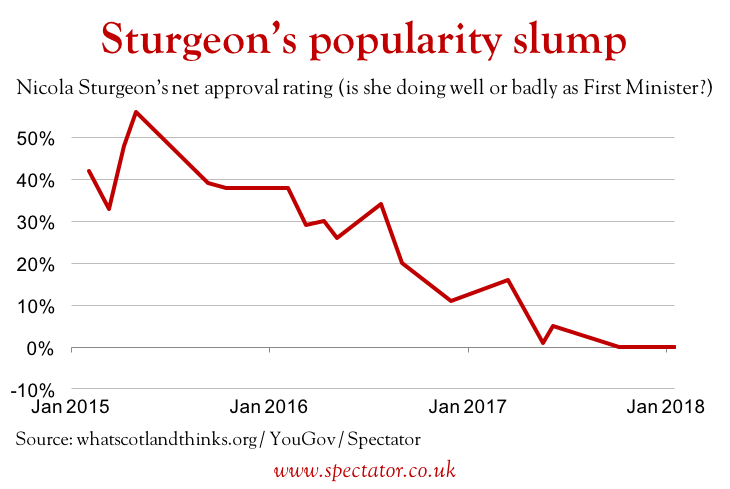Time is beginning to run out for Nicola Sturgeon. That, at any rate, is one conclusion to be drawn from today’s YouGov poll for the Times. As many Scots now disapprove of Ms Sturgeon as approve of her and the SNP’s poll ratings continue to show no signs of benefitting from the Brexit bounce the party expected.
That bounce continues to elude the nationalist movement. And if this has surprised the SNP, it has also surprised every other party leader in Scotland just as, to be frank, it has surprised most of us in the commentary game too. It turns out there is limited enthusiasm for responding to one constitutional clusterfuck with another.
Even so, it is important to note that support for independence – at 43 per cent – has only barely diminished. But supporting independence and getting to independence are two quite different things. And this is where Sturgeon runs into problems. According to today’s Times poll, a mere 36 per cent of voters want a second independence referendum at any point within the next five years.
The bad news for the nationalists does not end there. If a general election were held now, Sir John Curtice estimates that the SNP would lose a further eight seats, leaving the party with fewer than half the seats it won as recently as 2015. Meanwhile, at 38 per cent for the constituency vote and 32 per cent on the regional list vote, support for the SNP is lower than it has been in any YouGov poll since 2014.
Sturgeon finds herself trapped. On the one hand she must give the true believers reason to think a second plebiscite is just around the corner; on the other, every time she raises the referendum issue she hardens opposition to her plans. There she goes again, voters think, a one trick pony obsessed with restarting a constitutional conflict they thought settled in 2014. It is too soon, they think, and it is not on.
On Monday the Scottish government released a largely sensible paper outlining what it claims will be the grievous economic costs of Brexit. Leaving the EU is going to hit the UK economy and it may clobber the Scottish economy especially severely. There is still time, Sturgeon says, to avoid this nonsense.
Unfortunately, the paper also made a compelling case against independence. If, as the SNP argues, it is a terrible blunder for the UK to be leaving its most important market it must also, at least in an economic sense, be a grotesque mistake for Scotland to leave a UK market that is four times more important to the Scottish economy than the EU market is.
Now there is, to be sure, more to independence than just the economic numbers but when you start talking like that in the Scottish context you begin to sound a little like those demented Brexiteers thwacking on about Britain’s imminent ‘independence day’ that will be celebrated when the glorious day of Brexit liberation finally happens. And this, in Scotland anyway, is not a great look.
You are, as I wrote in the Times yesterday, only as good as your last election and if Theresa May was the biggest casualty last June, Nicola Sturgeon was the second greatest loser on the night. You cannot claim to speak for the people or consider your party their will made flesh when you lose 21 seats and a quarter of your vote.
Just as significantly, the election result gave the UK government just enough moral authority to refuse Sturgeon’s demands for a second referendum. She still hopes to force one but, for the time being anyway, it is difficult to see how or why the UK government should agree to one.
Sturgeon’s hopes have always depended on No-Remain voters being so appalled by Brexit they will be open to reconsidering their preferences on the Scottish question. Some doubtless are but rather more take the view that there is little advantage in responding to the loss of a foot by amputating your arm. Moreover, at least some resent the manner in which their No vote is being used by Sturgeon for her own aims.
Two things, however, should concern Unionists. First, there remains the possibility of a fresh UK general election before the next scheduled Scottish parliamentary elections in 2021. At present, sure, the numbers do not look great for the SNP but recent history suggests numbers can swing in any direction very quickly. An SNP victory in Scotland – i.e. taking half or more of the available seats – might be construed as a mandate for a second push for independence. (This would be a reversion to pre-devolution SNP policy, of course.)
That may seem a long-shot right now but the second matter that should concern Unionists is the 2021 Holyrood election itself. This, as they say, will be a game for all the marbles. The SNP is riding low at present but even on these figures Professor Curtice estimates that there would be 63 pro-independence MSPs at Holyrood (53 nationalists and 10 Greens), just two short of the 65 needed for a pro-independence majority that could pass a referendum bill that, this time, the UK government would find it very hard to thwart.
Which is to say, it will be a damn close run thing with little margin for error on either side. The clock may be ticking for Sturgeon but the game is not yet lost.







Comments